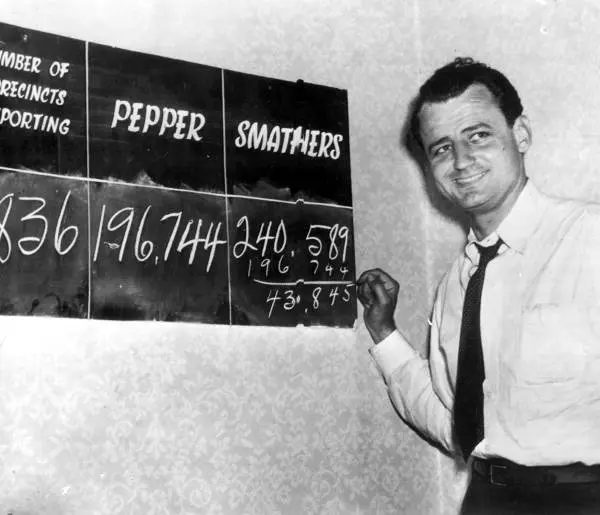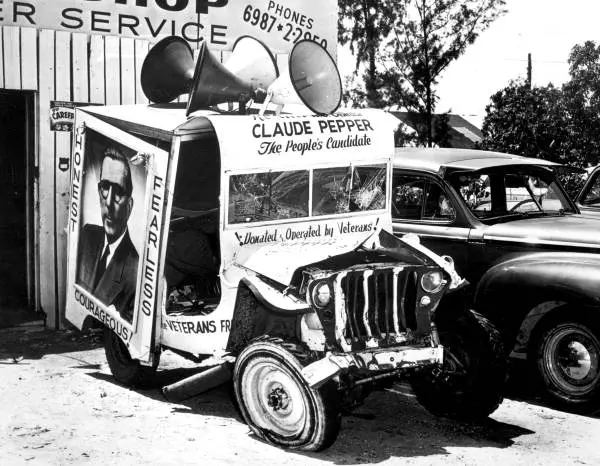Personal attacks and name calling have a long tradition in American political campaigns. When polled, people overwhelmingly say they do not approve of such tactics, yet election results demonstrate that such negative campaigning is frequently successful.
When modern political commentators discuss the divisiveness of contemporary American politics, they often refer to Florida’s 1950 Democratic Primary as an example a particularly contentious campaign.
George Smathers defeated Claude Pepper in that hard fought contest for Florida’s seat in the United States Senate.
A cynical speech supposedly aimed at unsophisticated Florida voters was attributed to Smathers in the April 17, 1950 edition of Time magazine:
“Are you aware that Claude Pepper is known all over Washington as a shameless extrovert? Not only that, but this man is reliably reported to practice nepotism with his sister-in-law, he has a brother who is a known homo sapiens, and he has a sister who was once a thespian in wicked New York. Worst of all, it is an established fact that Mr. Pepper, before his marriage, habitually practiced celibacy.”
This speech has gained legendary status in political circles. It is probably the most famous speech that was never given.
“The idea was north Florida voters weren’t very bright, and if you used big words, you could confuse them and make the opponent sound terrible, simply by saying truthful things,” says James C. Clark, author of the book “Red Pepper and Gorgeous George: Claude Pepper’s Epic Defeat in the 1950 Democratic Primary.”
“Clearly this speech by Smathers was never given,” Clark says. “Smathers offered a $10,000 reward for anyone who could prove that the speech had been given. It’s amazing that Smathers served three terms in the Senate, he was close to Kennedy, he was close to Nixon, did a lot in Latin American affairs, and what he’s best remembered for is a speech he never gave.”
Unfortunately, this piece of political satire is sometimes still quoted as an actual example of campaign tactics in Florida.
Claude Pepper is today affectionately remembered as a champion of senior citizens, but in the decade leading up to the 1950 Democratic Primary, he was a controversial figure.
“Before World War II, he was the leading advocate for a military buildup in this country,” says Clark. “He told everyone who would listen that Hitler was going to be a problem for us. For that he was mocked. People on the senate floor mocked him, called him ridiculous.”
History proved Pepper to be correct about America’s participation in World War II, but not about our developing relationship with the Soviet Union.
“After the war, he thought that the coming issue would be relations with Russia, but this time he guessed wrong,” says Clark. “He bet that we would have good relations with Russia, and if he championed that, he would come out with a better reputation, just as he had with Hitler. Relations with Russia did not get better, they got far worse.”
Pepper visited Josef Stalin, and his stance on communism became a key issue in the 1950 campaign.
President Harry S. Truman and Pepper were political adversaries, and Truman personally asked Smathers to defeat Pepper in the senate race. The campaign was contentious, even though all three men were Democrats.
“I think if these two people were running today, George Smathers would be the Republican, and Claude Pepper would be the Democrat,” says Clark. “Back then, there was no Republican Party to speak of in Florida, and so the real election was the Democratic Primary. Whoever won the primary would get the election.”
Clark points out that even today, there are conservative and progressive elements in both major political parties, and that primary races are where “they battle it out for the soul of their party.”
Although he lost the senate seat he had held since 1936, Pepper went on to serve Florida in the United States House of Representatives from 1963 until his death in 1989.
Smathers would serve in the United States Senate from 1951 to 1969. The library system at the University of Florida in Gainesville and a beach in Key West are named after him.
Smathers is also still remembered for a speech he never gave.

